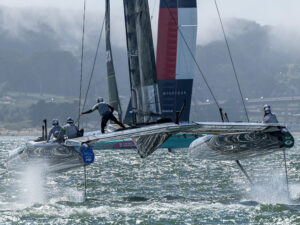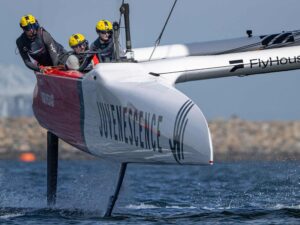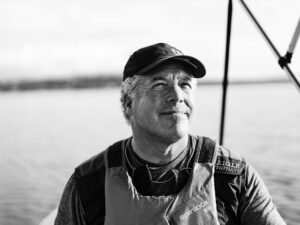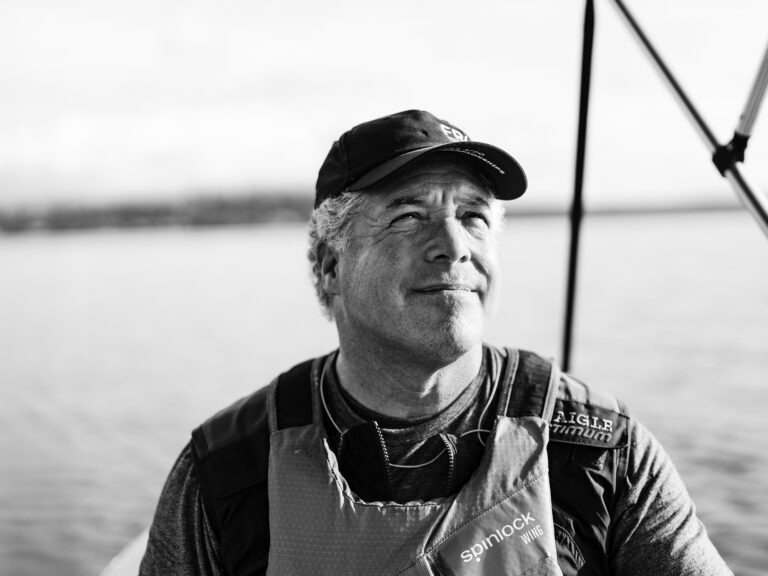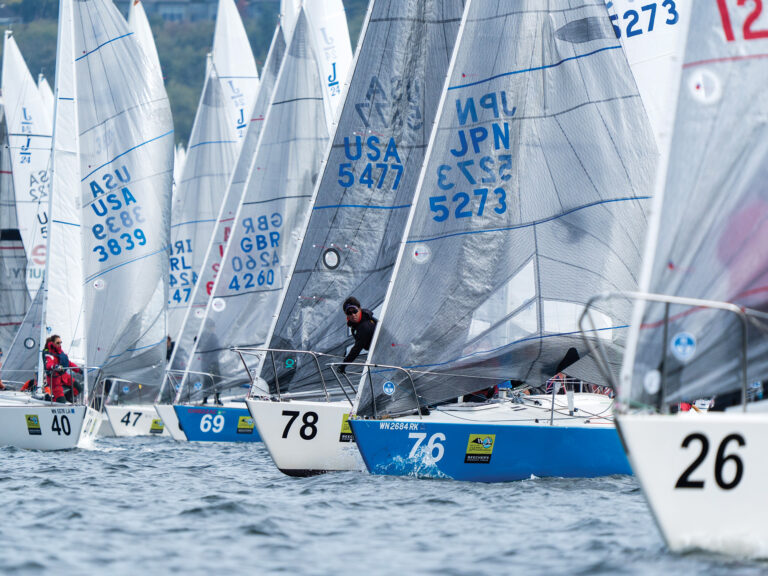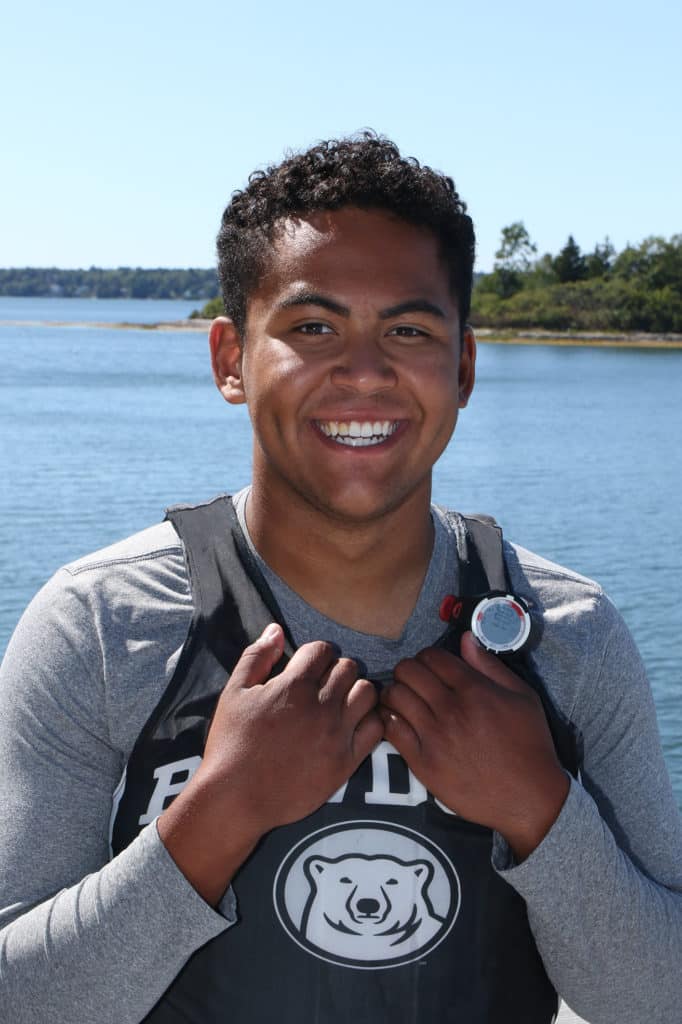
One man can launch a movement. Even a very young man. Even a very young, African-American man. Even a rare, very young, Black man who grew up sailing in Chicago and arrived at Bowdoin College, Maine, good to go on the Polar Bear sailing team. Not that he knew he was starting something that would grow by leaps and bounds, and not that he had a campaign plan, exactly. Instead, Preston Anderson politely, with innocent vigor, inquired of his coaches in the midst of the social upheavals of 2020 if there wasn’t “something” they could do right there as a mere college sailing team on the shores of Harpswell Sound. Then he hit the phones.
Fast forward less than a year to spring 2021, and what began as a conversation at Bowdoin meshed with other forces to become a rising TIDE, The Inclusivity, Diversity, Equity task force active on campuses across the USA, spreading to Canada and the UK. Preston Anderson struck a nerve because, in this difficult moment, there is a wellspring of young people who don’t understand why things should remain as they are, and they stand ready to change themselves as part of something bigger than themselves. “Sailing is the sport I love,” Anderson says. “I always wanted to find ways to bring more people in, but I didn’t know how. It doesn’t have to be such a white sport. Seeing these beginnings—it’s really cool.”
At Eckerd College on the Gulf Coast of Florida, we find Josh Cole, who came to a role at TIDE, “because I asked too many questions.” It is also the case that Cole works as an EMT. Emergency medical calls take him deep into a world that he never saw back home in an upscale San Francisco suburb where a garage packed with hundred-thousand-dollar cars is just another garage. “It’s changed me,” he says. “Starting college, I was studying political science and psychology, just checking the boxes without a compelling mission. Working as an EMT in South St. Petersburg opened my eyes. Now I know I grew up in a bubble. In the community around the college are all the festering issues that TIDE is trying to address. As TIDE volunteers, we looked at US Sailing’s offerings, the Siebel Sailors Program for one, to challenge ourselves—what could we bring to that? And when I talk to Level 1, Level 2 instructors, I tell them, yes, it’s fun to teach at a big yacht club, but maybe you’d rather do something to make a difference. Teaching people to sail is not only about a skill set. It’s empowerment and what that can do for a sense of self.”
Inevitably, the pandemic lockdowns stalled many good intentions, but energy levels are high. Operating in a “what’s possible” mode—meaning Zoom call upon Zoom call—and with the guidance of Bowdoin coaches Frank Pizzo and Cori Radke (now national chair of TIDE) Preston and a team of undergraduates from around New England created an initial, living-document, education curriculum. It became an awareness exercise in the dimensions of diversity, equity, inclusion and the ways in which a well-meaning, privileged all-too-human might be blind to that privilege, or innocently blind to the challenges facing someone else. With that comes the task of bringing all parties together so they walk away better.
It worked.
Almost all New England colleges participated. Radke describes it as “one of the best DEI programs I’ve ever experienced. The only way you would know it was put together by undergrads was a lapse in time management. Even so, it kept people engaged the whole way.”
Over the course of summer and fall, 2020, the New England region of collegiate sailing adopted TIDE’s proposed bylaws and a DEI awareness plan for its teams in the future. ICSA, the Interscholastic Collegiate Sailing Association—working from its own playbook—took TIDE national, embracing the challenge of becoming an agent of change, going a step beyond its traditional mission of creating schedules and staging regattas.
TIDE in Canada is “in the early stages; we’re getting organized and we’ve completed our mission statement,” says Hollister Rhone, a student at McGill University, Montreal, who is also (already) secretary to New England’s TIDE group and a representative to ICSA TIDE. Since a number of Canadian schools participate in college regattas around New England, there is a network of players in common. At Dalhousie University in Halifax, Maine-born Sierra Fahrman has similar U.S. ties while being herself a cofounder of TIDE for the Canadian Intercollegiate Sailing Association (CICSA), which she describes as unfunded and run by undergraduates. “We’re trying to partner with Sail Canada, our national governing body,” Fahrman says. “We’re trying to expand within CICSA and, looking at the yacht clubs that run junior programs, we see that we need them on our side too.”
As a white girl with no driving issues, Fahrman says, she nevertheless gets the big picture: “I came up sailing, but I was always on scholarship. People treated me as an outsider because I wasn’t a member of the yacht club, not really a member of their community, and it left me with a point of view.” TIDE is likewise in early stages in the UK, developing through the British Universities Sailing Association.
Although TIDE originated in race issues, any DEI discussion quickly expands to include gender equity. There is also LGBTQ inclusion, which is important to Brown University’s Izzy Cox because of her own orientation. On top of that, Cox is charged up by the networking that goes on within TIDE, meaning “so many stories” in a community spread across so many campuses—yes, on Zoom—and it builds in ways that regatta encounters don’t, and talk is not mere talk when it produces results.
Cox says, “At Brown we’re transitioning to varsity status. We need to deal with the fact that, in the past, too many freshman walk-ons did not stick.” One remedy? The team is planning a buddy system, pairing freshmen with older students, so newbies will not be left spinning off into the vastness of their new university world. “Last semester was not a real semester,’ Cox says, “but this fall, no newcomer will be all alone. We’ll mix varsity buddies and club buddies, so we’re all one in the big picture. Fall is the time to recruit. Everything feels fresh and new and exciting, and the water’s warm. Recruits need to know they’re part of something, and they need to feel it, because when we get to the drysuit season, that’s when we see who the real people are.”
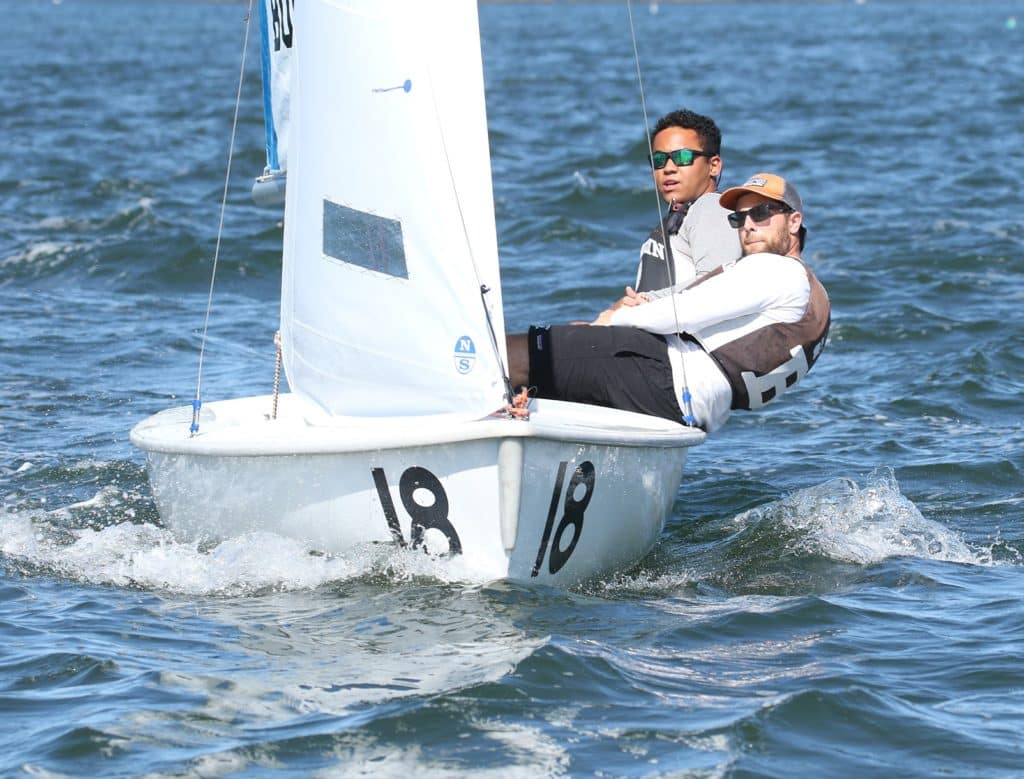
At Roger Williams University in Bristol, Rhode Island, TIDE members have created a gear exchange, to try to close cost barriers to entering college sailing. At MIT in Cambridge, Massachusetts, the head of TIDE’s community outreach subcommittee, Julia Wyatt, is engaging community sailing organizations to find ways that college sailors can contribute knowledge and enthusiasm. Wherever you look, there are efforts poised to kick into gear on the other side of the Covid pandemic. At the University of Pennsylvania, Emelia Bartusiak asks, “Why wouldn’t we want to share the beauty of sailing with as many people as possible? There is so much energy out there. I’m sorry to be graduating because I want to keep doing this.” [Graduate, Emelia, and keep at it.]
UC Berkeley’s Cal Sailing Team trains out of the Treasure Island Sailing Center in San Francisco Bay. TISC is a community sailing hub for the Siebel Sailors Program, making it natural for Cal’s Mackenzie Berwick to look beyond pandemic restrictions to someday building mentoring relationships with young sailors. “TISC can identify which kids want to be paired with a mentor,” Berwick says. “Then we can try one-on-one coaching, and perhaps that becomes a relationship that keeps the kid coming back. We can focus on kids of color who might not feel represented. Maybe we could make a difference. I have a friend who loved sailing but doesn’t sail now, because always, she was the only brown girl. She felt isolated. And then there was the day the coach gave sunscreen to all the kids—Except her.”
Which brings us back to TIDE’s education-and-awareness initiatives for teams and coaches, and the reason why talking can be more than just talking.
At UC San Diego, “There’s no recruiting; we’re a club sport,” says Noah Barton. There is also no TISC equivalent, but expanding the reach of college sailing on campus is a goal—a goal not easily achieved. Speaking for a lot of people, Barton adds, “We have a range of people on the team. We’re not all white, but neither are we representative of the university population or the national population. There’s no easy fix. We could advertise all day long that you can sail for only $175 per quarter, and it’s fun, and it’s satisfying, and we’re inclusive, and we’re welcoming, but there are people who will stay away because of their image of what sailing is and who it’s for. There is no cookbook for change.”
There is no cookbook but—Anderson notes that ICSA has developed a Sailors of Color Coalition, and ICSA’s affinity group for LGBTQ+ is now active (privately) on Facebook. Without effort, there can be no results. For a piece published in a Bowdoin College newsletter, Coach Pizzo spoke to the racial aspect of DEI as he told student reporter Rebecca Goldfine that he sees similarities between today’s push to open the sport to people of color, and earlier days when men were finally beginning to encourage women, rather than merely indulge the occasional interloper.
“In a lot of ways, the women’s part of the game is now the more robust. For sailing to stay relevant as a college sport, our teams have to reflect the campus makeup,” Pizzo says. “That will come from changing the culture so that teams are not just white spaces, and everyone can become their best selves in those spaces.”
To that end, TIDE members recently completed an ambitious demographic study of college sailing. Meanwhile, in western states that don’t have a concentration of sailing teams to match New England or the mid-Atlantic, TIDE is still building. The fervor is there, and from her perspective at CAL, Berwick observes, “Ideally, there would be more people of color to lead this, but their numbers are not enough, and it’s not fair to lay it all on them to build the future. I tell people this is something you want to be part of. You have to be impressed that all that has happened with TIDE emerged pretty much off the back of one person, Preston Anderson, and it spread so widely and quickly because the issues are obvious.”

